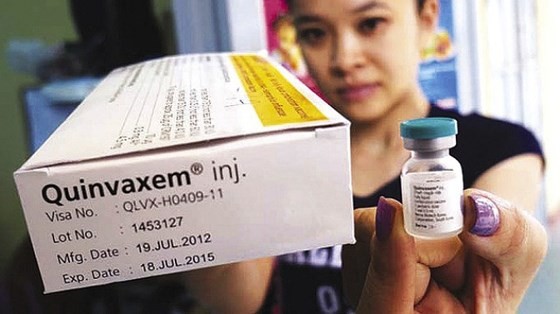
According to the Ministry, Korean-made Quinvaxem vaccine against diphtheria (D), tetanus (T), pertussis (P, whooping cough), hepatitis B (HepB), and Haemophilus influenza type b (Hib) has been used in the program for seven years.
Recently, Berna Biotech producer stopped making the vaccine while the remaining vaccine quantity is supposed to go short of by May, 2018 nationwide.
Therefore, the Ministry planned to use the new kind with same ingredient and effectiveness in preventing diseases to replace Quinvaxem vaccine in the program.
As per the plan, the five-in-one replacing vaccine made by India also achieve WHO-standards. Before it has been certified in Vietnam, over 400 million of dozes had been used in 40 nations in the world.
However, the replacing vaccine will be used in four provinces before it is administered to all kids across the country in the second quarter of the year. For years, Quinvaxem is a common vaccine in the nation with five million shoots annually; nevertheless, the vaccine has caused serious reactions and side-effects killing several kids in the country.
For adding the new vaccines into the National Expanded Immunization Program, the Ministry said that in the period 2014 – 2016, Vietnam has implemented injection of India-made measles- Rubella vaccine on over 23 million kids aged below 19 in a bid to control measles- rubella pandemic.
Subsequently, 2017 saw the lowest rate of infection within ten recent years
With the support of the Japanese government, Vietnam has made measles – Rubella vaccine. In March, 2018, the Vietnamese-made vaccine will be included in the immunization program. Initially, the locally-made vaccine was used in four provinces with good results. Hence, it will be used nationwide from April, 2018.
For polio vaccine, the Ministry announced that Vietnam has eliminated the disease since 2000 and no case of polio for 17 years. To maintain the good result, as per the World Health Organization’s advice, in addition to providing vaccine to infants at two, three and four month old orally, medical workers will inject five month infants with the vaccine as per the National Expand Immunization Program from August, 2018.
The Ministry warned parents to taken their children to medical clinics for vaccination to prevent fatal ailments. Moreover, because a study showed that pregnant women has low resistance to measles, the Ministry warned that women in the children-bearing age should be vaccinated to protect themselves and their children from measles- Rubella.
























